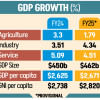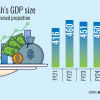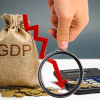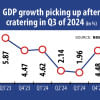GDP growth slows to 13-year low, excluding pandemic period

Bangladesh's gross domestic product grew 5.78 percent in the last financial year, one of the slowest paces of expansion in 13 years, as consumption nosedived, according to the final figures published by the Bangladesh Bureau of Statistics (BBS).
A provisional estimate released in May last year showed that the economy expanded by 6.03 percent in 2022-23, down from 7.1 percent in 2021-22.
FY23's GDP growth was one of the slowest since 2011-12, with the 3.42 percent posted in 2019-20 being the lowest, driven by the devastating effect of the coronavirus pandemic when many countries, in fact, saw contraction.
Compared to the provisional numbers, the growth rate in the agriculture and industrial sectors increased in the final estimate in FY23, while it decreased in the service sector.
The service sector's growth dropped 47 basis points to 5.37 percent in the last financial year that ended in June compared to the interim estimation. It was 6.26 percent in FY22.
Agriculture GDP was up 76 basis points to 3.37 percent.
The industrial sector GDP rose 19 basis points to 8.37 percent in FY23. It was 9.86 percent in the final estimate a year ago.
Owing to the lingering impacts of the coronavirus pandemic and the outbreak of the Russia-Ukraine war, Bangladesh's economy faced one of the worst periods in FY23, with foreign currency reserves plummeting, the taka losing its value sharply, and inflation surging to record levels.
Zahid Hussain, a former lead economist of the World Bank's Dhaka office, said the service sector saw slower growth mainly because of people's reduced purchasing power.
"On the one hand, the prices of essentials increased. On the other hand, wages did not go up. As a result, people had to cut back on their non-essential expenditures."
Activities in the transport sector and the trade sector also slowed down.
According to the BBS, the growth in wholesale and retail trades, which contribute 15.26 percent to the GDP, dropped 27 basis points to 6.38 percent. It was 8.46 percent in FY22.
The transport and storage sector, which accounted for 7.29 percent of the GDP, witnessed 50 basis points decline to 5.49 percent in the final estimate.
The service sector's performance was impacted by the slowdown in real estate, financial and insurance activities, accommodation, and food service activities.
On Thursday, the BBS, for the first time, published its quarterly report on GDP and released a report on the first quarter of the current fiscal year.
It showed the economy grew at 6.07 percent in July-September of 2023-24.
The agriculture sector witnessed an expansion of 0.84 percent while it was 2.07 percent in the same period of FY23.
The service sector's growth fell to 3.96 percent from 12.87 percent while the industrial sector grew by 9.67 percent against 7.17 percent a year earlier.
Hussain said the country has been experiencing higher inflation for the past two years. "This affected the service sector's growth."
In Bangladesh, inflation has stayed at an elevated level since May 2022.
Hussain termed the industrial sector GDP growth as "puzzling".
"Imports of raw materials, intermediate goods, and capital machinery declined. How could then the sector see an upward growth?"
Although the growth in the agriculture sector clocked an upward trend in last year's final estimate, it dipped in the first quarter of FY24.
Hussain, however, said: "Any degree of growth in the agriculture sector is positive because arable lands are not increasing. Rather, they are shrinking gradually."

 For all latest news, follow The Daily Star's Google News channel.
For all latest news, follow The Daily Star's Google News channel. 








Comments